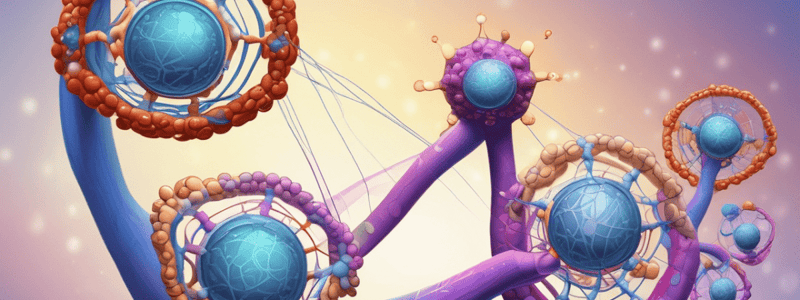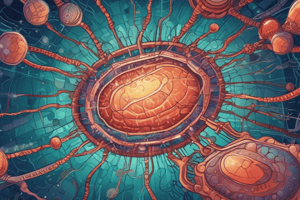Podcast
Questions and Answers
What enzyme is primarily responsible for lactose metabolism in E. coli?
What enzyme is primarily responsible for lactose metabolism in E. coli?
- RNA polymerase
- Galactoside permease
- β-galactosidase (correct)
- Thiogalactoside transacetylase
In the absence of an inducer, what happens to the lac operon?
In the absence of an inducer, what happens to the lac operon?
- The promoter activates transcription
- Transcription of structural genes is increased
- Allolactose binds to the operator
- The repressor binds to the operator (correct)
Which structural gene of the lac operon encodes for galactoside permease?
Which structural gene of the lac operon encodes for galactoside permease?
- lacZ
- lacI
- lacY (correct)
- lacA
What molecule serves as the inducer for the lac operon?
What molecule serves as the inducer for the lac operon?
What occurs when glucose is present and lactose is absent in E. coli?
What occurs when glucose is present and lactose is absent in E. coli?
What binds to the repressor to inactivate it, allowing transcription of the lac operon?
What binds to the repressor to inactivate it, allowing transcription of the lac operon?
Which three structural genes are part of the lac operon?
Which three structural genes are part of the lac operon?
What is the purpose of galactoside permease in lactose metabolism?
What is the purpose of galactoside permease in lactose metabolism?
What happens to the lac operon when lactose levels are high?
What happens to the lac operon when lactose levels are high?
What is the role of cAMP when glucose levels are low?
What is the role of cAMP when glucose levels are low?
At which position does the cAMP receptor protein (CRP) bind on the lac promoter?
At which position does the cAMP receptor protein (CRP) bind on the lac promoter?
Which enzyme is responsible for converting ATP to cAMP in E. coli?
Which enzyme is responsible for converting ATP to cAMP in E. coli?
What is catabolite repression?
What is catabolite repression?
What occurs when glucose levels are high in the E. coli cell?
What occurs when glucose levels are high in the E. coli cell?
Which of the following is a function of the sigma ($\sigma$) subunit in E. Coli RNA Polymerase?
Which of the following is a function of the sigma ($\sigma$) subunit in E. Coli RNA Polymerase?
Constitutive genes are continuously expressed in most cells because they:
Constitutive genes are continuously expressed in most cells because they:
Which regions do most bacterial promoters include for interaction with the sigma ($\sigma$) factor of RNA polymerase?
Which regions do most bacterial promoters include for interaction with the sigma ($\sigma$) factor of RNA polymerase?
Which of the following alterations can impede access of RNA Polymerase to its promoter?
Which of the following alterations can impede access of RNA Polymerase to its promoter?
Which statement correctly describes inducible genes?
Which statement correctly describes inducible genes?
What is the main role of the $eta$ subunit in E. Coli RNA Polymerase?
What is the main role of the $eta$ subunit in E. Coli RNA Polymerase?
Which is an example of a constitutive gene product?
Which is an example of a constitutive gene product?
Which mechanism allows for coordinated expression of different sets of genes in bacteria?
Which mechanism allows for coordinated expression of different sets of genes in bacteria?
What is required to turn on the expression of structural genes in positive control mechanisms?
What is required to turn on the expression of structural genes in positive control mechanisms?
In negative control mechanisms, what is the role of the product from the regulator gene?
In negative control mechanisms, what is the role of the product from the regulator gene?
Where does a repressor bind to inhibit transcription in negative regulation?
Where does a repressor bind to inhibit transcription in negative regulation?
In positive regulation, what molecular event facilitates the binding of RNA polymerase?
In positive regulation, what molecular event facilitates the binding of RNA polymerase?
What triggers the dissociation of the repressor from the DNA in negative regulation I?
What triggers the dissociation of the repressor from the DNA in negative regulation I?
Which region of the operon does the sigma factor bind to initiate transcription?
Which region of the operon does the sigma factor bind to initiate transcription?
What is the function of the repressor protein in the operon model?
What is the function of the repressor protein in the operon model?
What describes an operon?
What describes an operon?
Flashcards are hidden until you start studying
Study Notes
Gene Regulation
- Cells can change the expression of genes, as seen in the nucleus of an adult skin cell being transferred to an enucleated egg, resulting in an entire tadpole.
Constitutive Genes
- Constitutive genes are essential components of almost all living cells, performing "housekeeping" functions, such as molecules involved in protein synthesis (rRNA, tRNA, RNA polymerase subunits, etc.).
- These genes are continuously expressed in most cells.
E. Coli RNA Polymerase
- The core enzyme consists of α, ββ'ω subunits, while the holoenzyme consists of α2ββ'ωσ subunits.
- Functions of the subunits include:
- α: assembly of the tetrameric core
- β: ribonucleoside triphosphate binding site
- β': DNA template binding region
- σ: initiation of transcription
- Regulation at transcription initiation involves altering the specificity of RNA Polymerase-promoter interaction, impeding access of RNA Polymerase to its promoter, or using activators to enhance polymerase-promoter activity.
Inducible and Repressible Genes
- Inducible genes are expressed when needed, while repressible genes are turned off when not needed.
- Examples include the synthesis of alcohol dehydrogenase, which is only expressed when ethanol is present.
DNA Sequences Involved in Regulation of Gene Expression
- Most bacterial promoters include the conserved -10 region (Pribnow box) and -35 region, which interact with the σ factor of RNA polymerase.
- Some promoters also include the upstream element, which interacts with the α subunit of RNA polymerase.
Mechanisms to Regulate Transcription in Bacteria
- Two main mechanisms to regulate transcription in bacteria are:
- Using different σ factors in RNA Polymerase, such as sigma70 and sigma32, which recognize different classes of promoters and allow for coordinated expression of different sets of genes.
- Binding other proteins, transcription factors, to promoters, which recognize promoters of specific genes, bind small signaling molecules, undergo post-translational modifications, and alter their affinity toward DNA.
Negative Regulation
- In negative regulation, a bound repressor inhibits transcription by binding to the operator region of DNA, preventing RNA polymerase from binding to the promoter region.
- The repressor protein can be released from the operator by a molecular signal, allowing transcription to occur.
Positive Regulation
- In positive regulation, a bound activator facilitates transcription by binding to the promoter region of DNA, enhancing the binding of RNA polymerase to the promoter.
- The activator protein can be released from the promoter by a molecular signal, preventing transcription.
The Lac Operon
- The lac operon is a classic example of gene regulation, consisting of three linked structural genes (lacz, lacy, and lacA) that are transcribed as a unit.
- The lac operon has a promoter, operator, and activator binding site, and is regulated by the lac repressor and CRP (catabolite activator protein).
Induction of the Lac Operon
- The lac operon is induced when lactose is present and glucose is absent, allowing the cell to utilize lactose as an energy source.
- The inducer allolactose binds to the repressor, causing it to release from the operator, and allowing transcription of the structural genes to occur.
The Operon Model
- The operon model is a classic model of gene regulation, consisting of a cluster of related genes that are turned off or on together.
- It includes binding sites for activators and repressors, a promoter, and one or more genes whose expression is controlled by the operon.
Studying That Suits You
Use AI to generate personalized quizzes and flashcards to suit your learning preferences.



